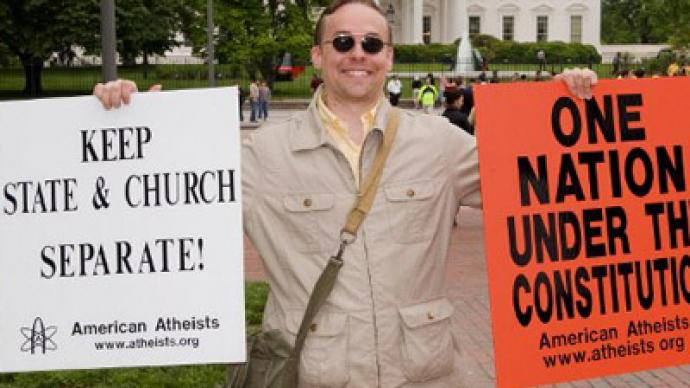Is ‘Year of the Bible’ making Christianity official religion of US?

Are some faiths more ‘legitimate’ than others in the US? The Freedom from Religion Foundation has filed a lawsuit over a State House resolution announcing 2012 as ‘the Year of the Bible’ calling it ‘hostile’, claiming it violates the US Constitution.
The Wisconsin-based organization, which has atheists and agnostics among its members, is suing the sponsors of the controversial resolution adopted by Pennsylvania House of Representatives, these being Rep. Rick Saccone, Republican-Allegheny; House clerk Tony Barbush; and House parliamentarian Clancy Myer. The document, declaring 2012 ‘the Year of the Bible’, is viewed as rather odd in a country considered to be secular and inhabited with people of various religions. The organization argues it is in breach of the US Constitution, which says the government should not issue laws on “the establishment of religion.” The resolution encourages Pennsylvanians to study tenets of the scriptures and that – according to The Freedom from Religion Foundation – violates the US Constitution’s mandatory separation of church and state.The resolution speaks about the Bible’s “formative influence” and mentions a “national need to study and apply” Scripture.The group has requested the US Middle District Court to look into the issue, as it says the resolution creates a “hostile environment” for those having religious views different from those of Christians and “implicitly marginalizes and disparages non-Christians and nonbelievers.” They insist the proclamation of “the Year of the Bible” establishes “an officially endorsed and preferred religion” in the country.The Madison foundation wants a federal judge to order that the resolution’s publishing and distribution is stopped and to rule that “the the state government isn’t Judeo-Christian”. It also wants the state public officials to repay costs and legal fees associated with the complaint.Several other organizations, among them the American Civil Liberties Union, the American Atheists and leaders of the Pennsylvania Council of Churches, also voiced concerns that the resolution violates the US Constitution.
‘God has always been a part of our government’
Responding to the accusations, Rick Saccone said on Monday that the lawsuit was meritless.“God has always been a part of our government,” he stated. He pointed out that biblical phrases decorate the State Capitol and other state historical sites. “To deny that is to deny history. And that’s all the resolution is – recognition of a book that has been so important in our nation’s history.”“It in no way inhibits anyone from believing in any faith or no faith,” he wrote in an editorial piece published in The Patriot-News last month.Barbush and Myer, the other two accused by The Freedom from Religion Foundation, declined to comment.
A 2007 survey (Religious Composition of the US – US Religious Landscape Survey, Pew Forum on Religion & Public Life, 2007) said 78.4% of adults identified themselves as Christian. The leading non-Christian creeds registered were Judaism (1.7%), Buddhism (0.7%), Islam (0.6%), Hinduism (0.4%), and Unitarian Universalism (0.3%). According to the same survey, around 16.1% of Americans identified themselves as agnostic, atheist, or simply having no religion.
The contentious resolution was passed in the House unanimously in January. However, some members later said they did not realize its content and regretted their votes. The lawsuit says the measure was described as “non-controversial” and was bundled with other proposals, “a buried item in a bundle of unrelated resolutions.”Officially the US is a secular nation. The First Amendment of the US Constitution guarantees the free exercise of religion and forbids the establishment of any religious governance.














